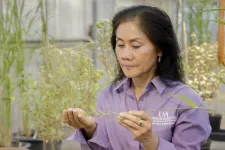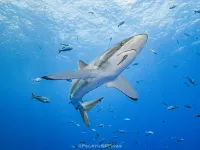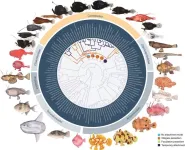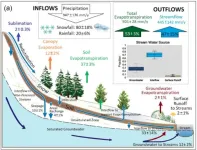(Press-News.org) Researchers from Carnegie Mellon University's School of Computer Science will contribute to two multi-institution research initiatives aimed at reducing the use of carbon and creating sustainable computing.
The projects recently received funding through the U.S. National Science Foundation's (NSF) Expeditions in Computing Awards program, which is providing $36 million to three projects selected for their potential to revolutionize computing and make significant impacts toward reducing the carbon footprint of the lifecycle of computers. The Expeditions program is an ambitious initiative providing some of the largest investments from the NSF's Directorate for Computer and Information Science and Engineering (CISE) to support transformative research poised to yield lasting impacts on society, the economy and technological advancement.
"We are thrilled to announce these visionary projects that will advance environmental responsibility and foster innovation in the field of computing," said Dilma Da Silva, acting assistant director for CISE. "Congratulations to these pioneering teams, whose research will forge new pathways in computational decarbonization and in revolutionizing operating system design with machine learning."
Computational Decarbonization
One project, NSF Expeditions in Computing for Computational Decarbonization of Societal Infrastructures at Mesoscales, will develop the new field of computational decarbonization (CoDec) to focus on the lifecycle of carbon emissions — from production and use — across different societal infrastructures such as computing, transportation, buildings and the power grid.
Climate change from carbon and other greenhouse gas emissions poses an existential threat to the Earth's ecosystem and humanity. But curbing energy use and focusing on energy efficiency will not sufficiently reduce carbon emissions. Instead, efforts should aim for decarbonization by focusing on and optimizing for carbon efficiency.
SCS faculty will collaborate with researchers from five institutions to develop new sensing technologies to better show and track carbon footprints, use AI and optimization theories to further energy flexibility, and ultimately create software and systems to optimize carbon use. Yuvraj Agarwal will serve as the lead principal investigator from CMU and will be joined by Zico Kolter on the project team. Agarwal and Kolter bring a host of expertise to the project, in topics including sensing, systems, security and privacy, artificial intelligence, using data to incentivize decision making, and understanding how computing interacts with smart buildings and efficient infrastructure.
"This project will use computing techniques to help address decarbonization, which is arguably one of this generation's most pressing societal challenges," said Agarwal, an associate professor of computer science in the Software and Societal Systems Department (S3D) and the Human-Computer Interaction Institute. "A cross-disciplinary approach is needed to make progress, and this is exactly the type of challenge that CMU, its School of Computer Science and especially the Software and Societal Systems Department within the school is designed to tackle."
Agarwal will work to devise systems to track carbon in a verifiable manner at different scales and across societal infrastructures that we all use. This effort includes using sensing and inference techniques to characterize the embodied and operational carbon and presenting the information in an actionable format to spur change. Agarwal will create systems that treat carbon emissions as a first-class design constraint and optimization objective.
"Real-time data on carbon emissions from power plants and the energy grid; embedded sensors; and the connectivity of buildings, vehicles and infrastructure are giving us a better picture of the lifecycle of carbon and the data needed to develop methods to reduce it," Agarwal said.
Kolter will develop machine learning methods to integrate optimization processes and simulations directly within the models themselves. This process can allow the models to leverage the benefits of data-driven AI techniques, while simultaneously incorporating known knowledge about physical processes and other "constraints" of real-world environments.
"Continued advancements in computing and AI coupled with the severe impacts of climate change make the timing ripe for this project," said Kolter, an associate professor in the Computer Science Department.
Sustainable Computing
Emma Strubell, the Raj Reddy Assistant Professor of Computer Science in the Language Technologies Institute, will contribute to a second Expeditions project. NSF Expeditions in Computing: Carbon Connect – An Ecosystem for Sustainable Computing, co-led by Harvard University and the University of Pennsylvania, will lay the foundation for sustainable computing.
Limiting global warming in accordance with the Paris Agreement will require an estimated 45% reduction in greenhouse gas emissions from the information and communication technology sector by 2030 over a 2020 baseline. To achieve this goal, Carbon Connect will focus on reducing the environmental impact of computer systems themselves by identifying and developing the foundational technologies required to potentially spark a transformation in how these systems are manufactured, allocated and consumed. This work could lead to a more responsible and sustainable approach to advancing computing technologies.
"Recent technological advances, such as generative AI, have great potential to help address substantial societal challenges, including climate change. However, these same technologies come with a high carbon footprint that must be drastically reduced over a short time period to meet climate goals," said Strubell, who will lead the project's applications theme, which will focus on generative AI and virtual spaces. "Realizing the necessary reduction in emissions will require cross-cutting innovations that take into account inherent tradeoffs in emissions up and down the technology stack, alongside close collaborations with industry and policymakers, which is exactly what we aim to achieve with this highly collaborative project."
Beyond advancing the state of the art in hardware, software and datacenter efficiency, Carbon Connect intends to establish new standards for carbon accounting in the computing industry, thereby influencing future energy policy and legislation.
Learn more about the Expeditions in Computing Awards on the NSF's website.
END
Carnegie Mellon University researchers to tackle carbon use, sustainability through NSF expeditions in computing awards
2024-05-23
ELSE PRESS RELEASES FROM THIS DATE:
USDA-NIFA grant supports microwave tech to zap weed seeds
2024-05-23
By John Lovett
University of Arkansas System Division of Agriculture
FAYETTEVILLE, Ark. — It’s not just for burritos and popcorn. Microwave technology is also being tested as a new tool to destroy weed seeds and decrease herbicide use.
Scientists and engineers with the Arkansas Agricultural Experiment Station are investigating the use of 915 MHz microwaves to neutralize a variety of weed seeds underground. The study is supported by a nearly $300,000 Agriculture and Food Research Initiative grant from the U.S. Department of Agriculture’s National Institute of Food and Agriculture, with additional support ...
Research spotlight: AI enabled body composition analysis predicts outcomes for patients with lung cancer treated with immunotherapy
2024-05-23
Tafadzwa Chaunzwa, MD, a researcher in the Artificial Intelligence in Medicine (AIM) Program at Mass General Brigham and a senior resident physician at the Harvard Radiation Oncology Program, is the lead author of a paper published in JAMA Oncology. Chaunzwa and senior author Hugo Aerts, PhD, director of the AIM Program, and associate professor at Harvard University, shared highlights from their paper.
How would you summarize your study for a lay audience?
As treatments like immunotherapy improve cancer survival rates, there is a growing need for clinical decision-support tools that predict treatment response ...
Silky shark makes record breaking migration
2024-05-23
In a recent study, researchers from the Charles Darwin Foundation (CDF), in collaboration with the Guy Harvey Research Institute (GHRI) and Save Our Seas Foundation Shark Research Center (SOSF-SRC) at Nova Southeastern University in Florida, and the Galapagos National Park Directorate (GNPD) have documented the most extensive migration ever recorded for a silky shark (Carcharhinus falciformis), revealing critical insights into the behavior of this severely overfished species and emphasizing the urgent need for cooperative international management measures to prevent further population declines.
The ...
Sexual parasitism helped anglerfish invade the deep sea during a time of global warming
2024-05-23
Members of the vertebrate group including anglerfishes are unique in possessing a characteristic known as sexual parasitism, in which males temporarily attach or permanently fuse with females to mate. Now, researchers reporting in the journal Current Biology on May 23 show that sexual parasitism arose during a time of major global warming and rapid transition for anglerfishes from the ocean floor to the deep, open sea.
The findings have implications for understanding evolution and the effects that global warming may have in the deep sea, according to the researchers.
“Our results show how the ...
Archaeology: Differences in Neanderthal and Palaeolithic human childhood stress
2024-05-23
Neanderthal children (who lived between 400,000 and 40,000 years ago) and modern human children living during the Upper Palaeolithic era (between 50,000 and 12,000 years ago) may have faced similar levels of childhood stress but at different developmental stages, according to a study published in Scientific Reports. The authors suggest that these findings could reflect differences in childcare and other behavioural strategies between the two species.
Laura Limmer, Sireen El Zaatari and colleagues analysed the dental enamel of 423 Neanderthal teeth (from 74 Homo neanderthalensis individuals) and 444 Upper Palaeolithic humans (from 102 Homo sapiens ...
Rising temperatures will significantly reduce streamflow in the upper Colorado river basin as groundwater levels fall, new research shows
2024-05-23
The Colorado River makes life possible in many Western cities and supports agriculture that sustains people throughout the country. Most of the river’s water begins as snowmelt from the mountainous watersheds of Colorado, Utah, and Wyoming, and a warming climate will drastically reduce these streamflows, new research finds.
Researchers from Desert Research Institute (DRI), USGS, and Lawrence Berkeley National Laboratory teamed up for the new study, published May 23 in Nature Water. By applying warming to historical conditions for the East River in Colorado and using computer simulations to observe the impact on streamflow and groundwater ...
Prenatal exposure to chemical mixtures and metabolic syndrome risk in children
2024-05-23
About The Study: The findings of this cohort study suggest that prenatal exposure to endocrine-disrupting chemical mixtures may be associated with adverse metabolic health in children. Given the pervasive nature of endocrine-disrupting chemicals and the increase in metabolic syndrome, these findings hold substantial public health implications.
Corresponding Author: To contact the corresponding author, Martine Vrijheid, Ph.D., email martine.vrijheid@isglobal.org.
To access the embargoed study: Visit our For The Media ...
Effectiveness of a school- and primary care–based HPV vaccination intervention
2024-05-23
About The Study: In this cluster randomized trial, within the context of the late COVID-19 pandemic period and limited school and general practitioner participation, at-school human papillomavirus (HPV) vaccination significantly increased vaccination coverage. The trial did not show a significant effect for training general practitioners and education and motivation, although it may be observed after more time has elapsed after the intervention.
Corresponding Author: To contact the corresponding author, Morgane Michel, Ph.D., email morgane.michel@aphp.fr.
To access the embargoed study: Visit our For The Media website at this link https://media.jamanetwork.com/
(doi:10.1001/jamanetworkopen.2024.11938)
Editor’s ...
Exposure to mixtures of endocrine-disrupting chemicals during pregnancy is associated with higher odds of metabolic syndrome in children
2024-05-23
The term ‘metabolic syndrome’ (MetS) encompasses a group of factors, such as abdominal obesity, hypertension and insulin resistance, that together increase the risk of cardiovascular disease and type 2 diabetes. A new study suggests that prenatal exposure to a combination of endocrine disrupting chemicals (EDCs) is associated with a poorer metabolic health in childhood, which in turn may contribute to an increased risk of metabolic syndrome in adulthood. The research, led by the Barcelona Institute for Global Health (ISGlobal), a centre supported by the "la Caixa" Foundation, has been published in JAMA Network Open.
EDCs ...
Sea of love: Behind the unusual sexual parasitism of deep-water anglerfishes
2024-05-23
New Haven, Conn. – As the planet’s most expansive ecosystem, the deep sea can be a tough place to find a mate. Though, scientists say, some deep-sea anglerfishes evolved a unique method of reproduction that ensures that once they land a partner in the vast open waters, they remain latched for life.
These anglerfishes, called ceratioids, reproduce through sexual parasitism, in which the tiny males attach to their much larger female counterparts to mate. In some species, the males bite the females ...




